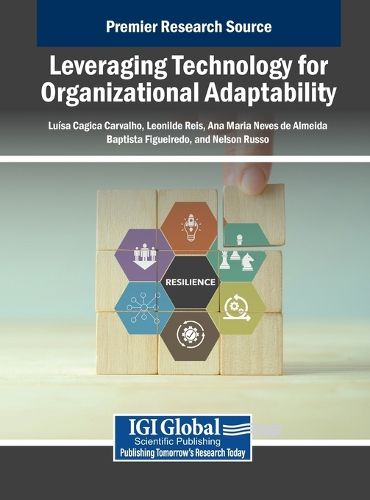Readings Newsletter
Become a Readings Member to make your shopping experience even easier.
Sign in or sign up for free!
You’re not far away from qualifying for FREE standard shipping within Australia
You’ve qualified for FREE standard shipping within Australia
The cart is loading…






This title is printed to order. This book may have been self-published. If so, we cannot guarantee the quality of the content. In the main most books will have gone through the editing process however some may not. We therefore suggest that you be aware of this before ordering this book. If in doubt check either the author or publisher’s details as we are unable to accept any returns unless they are faulty. Please contact us if you have any questions.
As industries face constant change driven by market demands, technological advancements, and global challenges, organizations must remain agile. Technology enables businesses to quickly adjust their processes, optimize workflows, and improve decision-making through data-driven insights. Whether through cloud computing, AI-powered analytics, or collaborative tools, digital solutions provide the flexibility to adapt to new conditions, respond to customer needs, and maintain a competitive edge. Embracing these technologies will enhance efficiency while fostering innovation and resilience, allowing organizations to pivot effectively in the face of uncertainty and capitalize on emerging opportunities. Leveraging Technology for Organizational Adaptability explores the interplay between organizational resilience and the transformative forces of digital transformation, digitalization, Internet of Things (IoT), innovation and sustainability, and cloud computing. It examines how technological advancements shape and fortify organizational resilience in the face of adversity, bridging the gap between conceptual understanding and practical application. This book covers topics such as digital technology, personalized education, and information systems, and is a useful resource for computer engineers, data scientists, business owners, educators, academicians, and researchers.
$9.00 standard shipping within Australia
FREE standard shipping within Australia for orders over $100.00
Express & International shipping calculated at checkout
This title is printed to order. This book may have been self-published. If so, we cannot guarantee the quality of the content. In the main most books will have gone through the editing process however some may not. We therefore suggest that you be aware of this before ordering this book. If in doubt check either the author or publisher’s details as we are unable to accept any returns unless they are faulty. Please contact us if you have any questions.
As industries face constant change driven by market demands, technological advancements, and global challenges, organizations must remain agile. Technology enables businesses to quickly adjust their processes, optimize workflows, and improve decision-making through data-driven insights. Whether through cloud computing, AI-powered analytics, or collaborative tools, digital solutions provide the flexibility to adapt to new conditions, respond to customer needs, and maintain a competitive edge. Embracing these technologies will enhance efficiency while fostering innovation and resilience, allowing organizations to pivot effectively in the face of uncertainty and capitalize on emerging opportunities. Leveraging Technology for Organizational Adaptability explores the interplay between organizational resilience and the transformative forces of digital transformation, digitalization, Internet of Things (IoT), innovation and sustainability, and cloud computing. It examines how technological advancements shape and fortify organizational resilience in the face of adversity, bridging the gap between conceptual understanding and practical application. This book covers topics such as digital technology, personalized education, and information systems, and is a useful resource for computer engineers, data scientists, business owners, educators, academicians, and researchers.